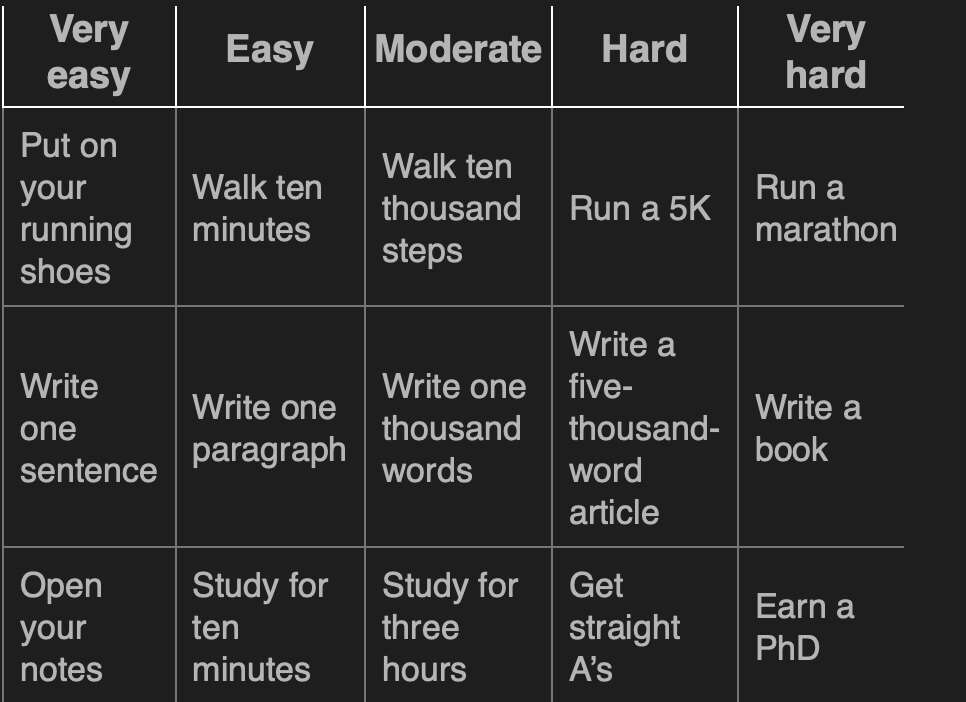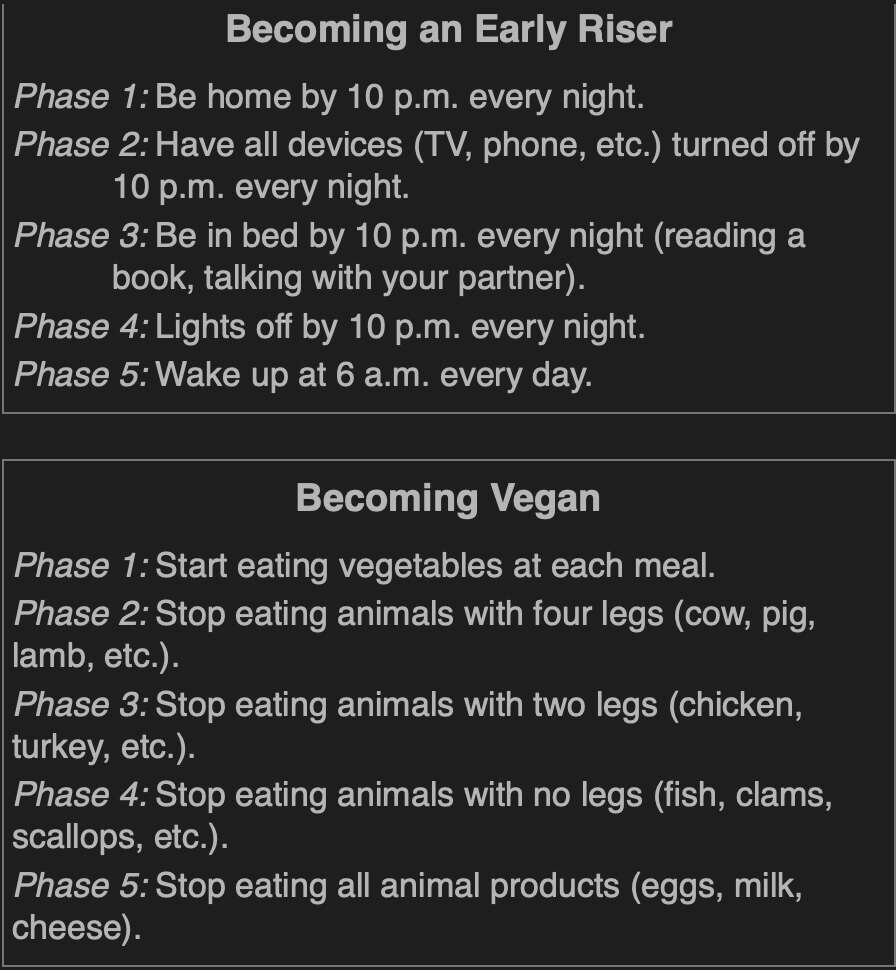Twyla Tharp, considered one of the most influential dancers and choreographers of our time, received a MacArthur Fellowship, colloquially known as the Genius Grant, in 1992. She has dedicated much of her career to performing her original works worldwide. Interestingly, Tharp attributes a significant portion of her success to her daily habits.
In her own words, "I begin each day of my life with a ritual. I wake up at 5:30 A.M., put on my workout clothes, my leg warmers, my sweatshirt, and my hat. I walk outside my Manhattan home, hail a taxi, and instruct the driver to take me to the Pumping Iron gym at 91st Street and First Avenue, where I work out for two hours. The ritual is not the stretching and weight training I put my body through each morning at the gym; the ritual is the cab. The moment I tell the driver where to go, I have completed the ritual..."
Habits are like the entrance ramp to a highway. They lead you down a path and, before you realize it, you're quickly progressing toward the next behavior. Why? Because it’s easier to continue with an existing action than to initiate a new one.
- You’ll watch a bad movie for two hours just because you already turned it on.
- You continue to snack even when you're already full.
- You glance at your phone for "just a second" and suddenly twenty minutes have passed in screen time.
The things you do without thinking are often the overflow of the choices you make on purpose.
Every day, there are a handful of moments that deliver an outsized impact. I refer to these little choices as decisive moments.
- The moment you decide between ordering takeout or cooking dinner.
- The moment you select between going for a run or watching youtube on the couch.
- The moment you decide between starting your homework or grabbing the video game controller.
These choices are a fork in the road.
The difference between a good day and a bad day often hinges on productive and healthy choices made at critical moments. Each decision is a fork in the road, and these choices accumulate throughout the day, leading to vastly different outcomes.
Such critical moments shape the options available to your future self.
For example, entering a restaurant is a critical moment because it dictates what you'll be eating for lunch. While you have control over what you order, your choices are ultimately limited to what's on the menu. If you step into a steakhouse, you can choose between a sirloin or a rib eye, but pad thai won't be an option. Your choices are limited by what's available, and they're shaped by your initial decision.
Our habits run the show. That's why it's important to nail those pivotal moments throughout your day. Sure, each day has tons of moments, but it's those few repeat choices that really set your direction. These tiny decisions pile up, each one steering how you're gonna spend the next bit of time. Habits are the entry point, not the end point. They are the cab, not the gym.
WHY IT MATTERS: We all aim to make good decisions and carry out our intentions. But how do we strengthen this ability? For many of us, our bad habits have been present for so long that our good decision-making skills seem so weak. This is why mastering the habit of simply showing up is critical.
GO DEEPER: At first thought, a major life change might seem to require equally major action to pull off… However, this mindset can be harmful.
Even when you know you should start small, it’s easy to start too big. When you dream about making a change, excitement inevitably takes over and you end up trying to do too much too soon. The most effective way I know to counteract this tendency is to use the Two-Minute Rule, which states, “When you start a new habit, it should take less than two minutes to do."
- “Read before bed each night” becomes “Read one page.”
- “Do thirty minutes of yoga” becomes “Take out my yoga mat.”
- “Study for class” becomes “Open my notes.”
- “Fold the laundry” becomes “Fold one pair of socks.”
- “Run three miles” becomes “Tie my running shoes.”
The idea is to make your habits as easy as possible to start. Anyone can meditate for one minute, read one page, or put one item of clothing away. And, as we have just discussed, this is a powerful strategy because once you’ve started doing the right thing, it is much easier to continue doing it.
A new habit should not feel like a challenge. The actions that follow can be challenging, but the first two minutes should be easy. What you want is a “gateway habit” that naturally leads you down a more productive path.
People often think it’s weird to get hyped about reading one page or meditating for one minute or making one sales call. But the point is not to do one thing. The point is to master the habit of showing up.
The truth is, a habit must be established before it can be improved. If you can’t learn the basic skill of showing up, then you have little hope of mastering the finer details. Instead of trying to engineer a perfect habit from the start, do the easy thing on a more consistent basis. You have to standardize before you can optimize.
As you master the art of showing up, the first two minutes simply become a ritual at the beginning of a larger routine. This is not merely a hack to make habits easier but actually the ideal way to master a difficult skill. The more you ritualize the beginning of a process, the more likely it becomes that you can slip into the state of deep focus that is required to do great things.
- By doing the same warm-up before every workout, you make it easier to get into a state of peak performance.
- By following the same creative ritual, you make it easier to get into the hard work of creating.
- By developing a consistent power-down habit, you make it easier to get to bed at a reasonable time each night.
You may not be able to automate the whole process, but you can make the first action mindless. Make it easy to start and the rest will follow...
Strategies like this work for another reason, too: they reinforce the identity you want to build.
If you show up at the gym five days in a row—even if it’s just for two minutes—you are casting votes for your new identity. You’re not worried about getting in shape. You’re focused on becoming the type of person who doesn’t miss workouts. You’re taking the smallest action that confirms the type of person you want to be.
We rarely think about change this way because everyone is consumed by the end goal.
- But one push-up is better than not exercising.
- One minute of guitar practice is better than none at all.
- One minute of reading is better than never picking up a book.
It’s better to do less than you hoped than to do nothing at all.
Once you've established the habit and are consistently practicing it daily, you can combine the Two-Minute Rule with a technique known as habit shaping. This allows you to gradually scale your habit towards your ultimate goal. Start by mastering the first two minutes of the smallest version of the behavior. Then, advance to an intermediate step and repeat the process—focusing on just the first two minutes and mastering that stage before moving on to the next level.
Eventually, you’ll end up with the habit you had originally hoped to build while still keeping your focus where it should be: on the first two minutes of the behavior.
more tomorrow,
Hunter


